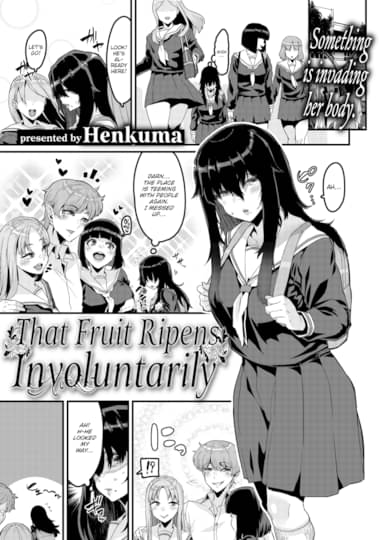Nighttime Sleepover Friends
Artist
Parody
Magazine
Publisher
Pages
16 pages
Favorites
903 favorites
A gal's first obscene experience ❤
Sample Pages
Top Comments
Recent Comments
2
6 years ago
The last panel is unclear to me. When Mikage refers to Himari as
"Himarin," is she deliberately using a funny variation of the name?
Or is she simply mispronouncing the name of someone she barely
knows, as a punch line to remind the reader that the girls who are
now intimate sex coworkers began the story as virtual strangers?
"Himarin," is she deliberately using a funny variation of the name?
Or is she simply mispronouncing the name of someone she barely
knows, as a punch line to remind the reader that the girls who are
now intimate sex coworkers began the story as virtual strangers?
Last Modified Mon Dec 24, 2018, 7:45 am
4
Sayo
FAKKU SR Translator
6 years ago
It's a cutesy version of the name Himari. She's basically "returning the favor" because of Himari's cutesy name for her, Mikagecchi.
2
AssasinZAssasin
Not Hentai Protagonist
6 years ago
Just a friend, yes.
Hmm, but still, it's too bad Mikage didn't get as much action as I was hoping, but what we got was pretty good too. And hey, she got her share in the end, and they managed to become friends too, so all is well, I guess?
Hmm, but still, it's too bad Mikage didn't get as much action as I was hoping, but what we got was pretty good too. And hey, she got her share in the end, and they managed to become friends too, so all is well, I guess?


















By one estimate, perhaps 10 percent of Japanese schoolgirls
(ages 13-18) have engaged in the "JK (joshi kÅsei) business,"
a form of "compensated dating" in which older men give gifts
or money to adolescent girls in return for companionship and
sometimes (but not always) sex. In most cases, the girls are
motivated, not by poverty or drug addiction, but by simple
materialistic greed and consumerism.
For example, a girl who desperately wants a new laptop or a
fancy designer handbag (in order to keep up with her friends)
might decide to rent herself out to an older man. It may be an
impulsive one-time transaction, and, as noted above, may not
even involve sex.
So Ichimatsu's funny story is also remarkably realistic. Mikage
is obviously a pro, a veteran JK-girl who believes in giving good
service for the money. We can easily imagine her recruiting a
vulnerable teenage runaway like Himari into the business.
The middle-aged client is an amusing character, a cynical,
easy-going perv, who's willing to pay generously for under-
age sex. Whenever he suggests a sexual trick to Mikage,
she gamely replies, "Okay," and goes right down to work.
This is probably meant to be a running gag. In any case,
she's clearly a good sport who's very agreeable, which is
a useful trait in a sex worker.
Last Modified Mon Dec 24, 2018, 7:52 am
Only on Fakku!
Last Modified Thu Dec 27, 2018, 6:53 pm
actually 13(!). Coitus prostitution, on the other hand,
is illegal, but a JK transaction doesn't necessarily
involve sex, which complicates the issue.
Civic groups condemn the JK business in general as
immoral, but feminists defend it as a form of female
empowerment. The government frowns on it, mainly
(I suspect) because it's bad international PR. They
don't want Japan to become known as the country
where cute schoolgirls drop their pantsu for old
perverts who wave money around.
From our point of view, the practice is not only squicky,
but potentially dangerous. However, the incidence of
rape and murder and other violent crimes in Japan is
extremely low, so the girls feel reasonably safe as they
go about their business. That's just one of several big
socio-cultural differences at the heart of the matter.
Last Modified Fri Dec 28, 2018, 5:42 am
The more you know about a particular subject, the more
you enjoy it. The more you know about Japanese culture
and society, the more you enjoy manga and anime.
In this case, Ichimatsu's story becomes more interesting
when you place it within the context of the JK business.
For instance, the fact that Himari is a teenage runaway
is more significant than you might think. From the Wiki:
"Cultural anthropologists have described Japan
as having a shame culture, creating a barrier
for teenage runaways to be reunited with their
families, making them vulnerable to recruiting
into the underage sex industry."
Last Modified Thu Jan 3, 2019, 12:49 pm